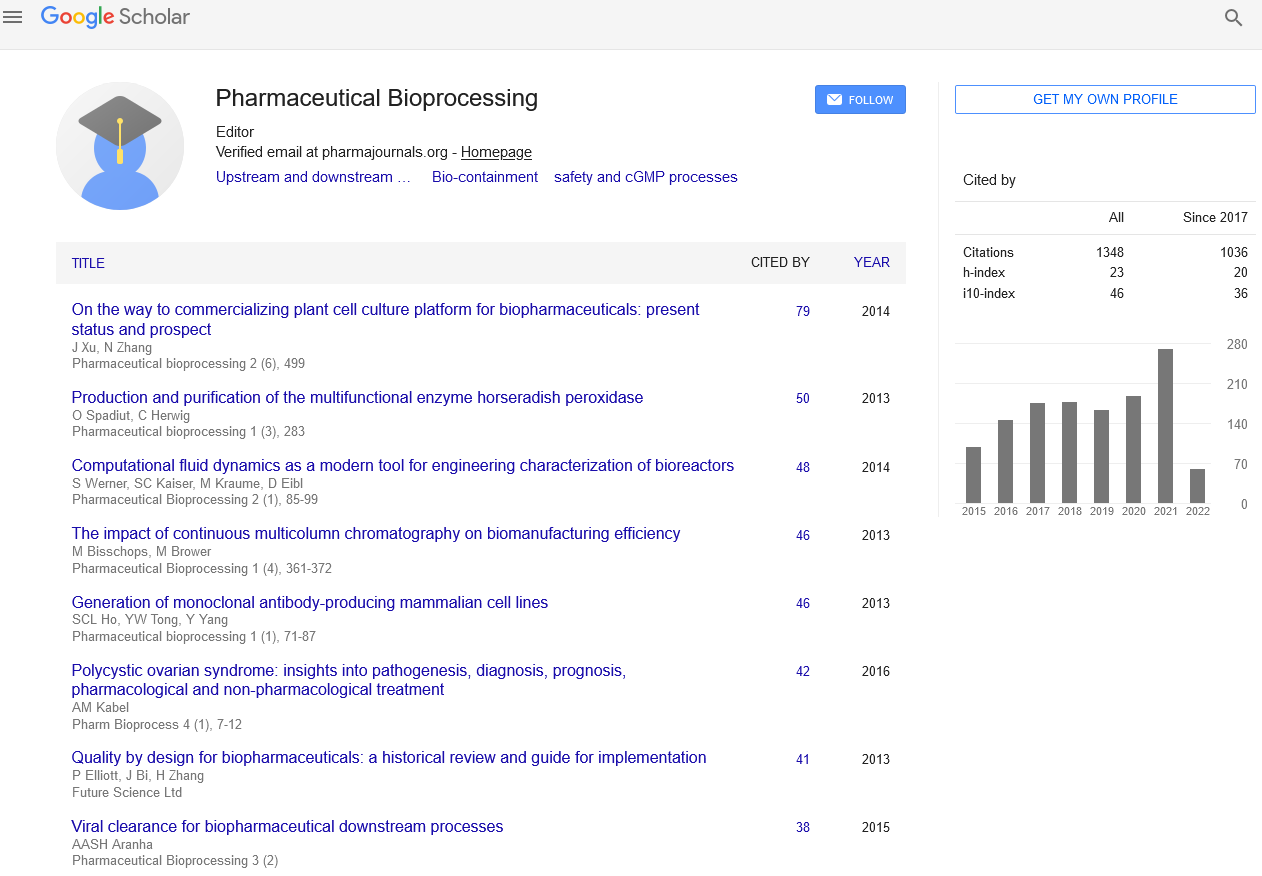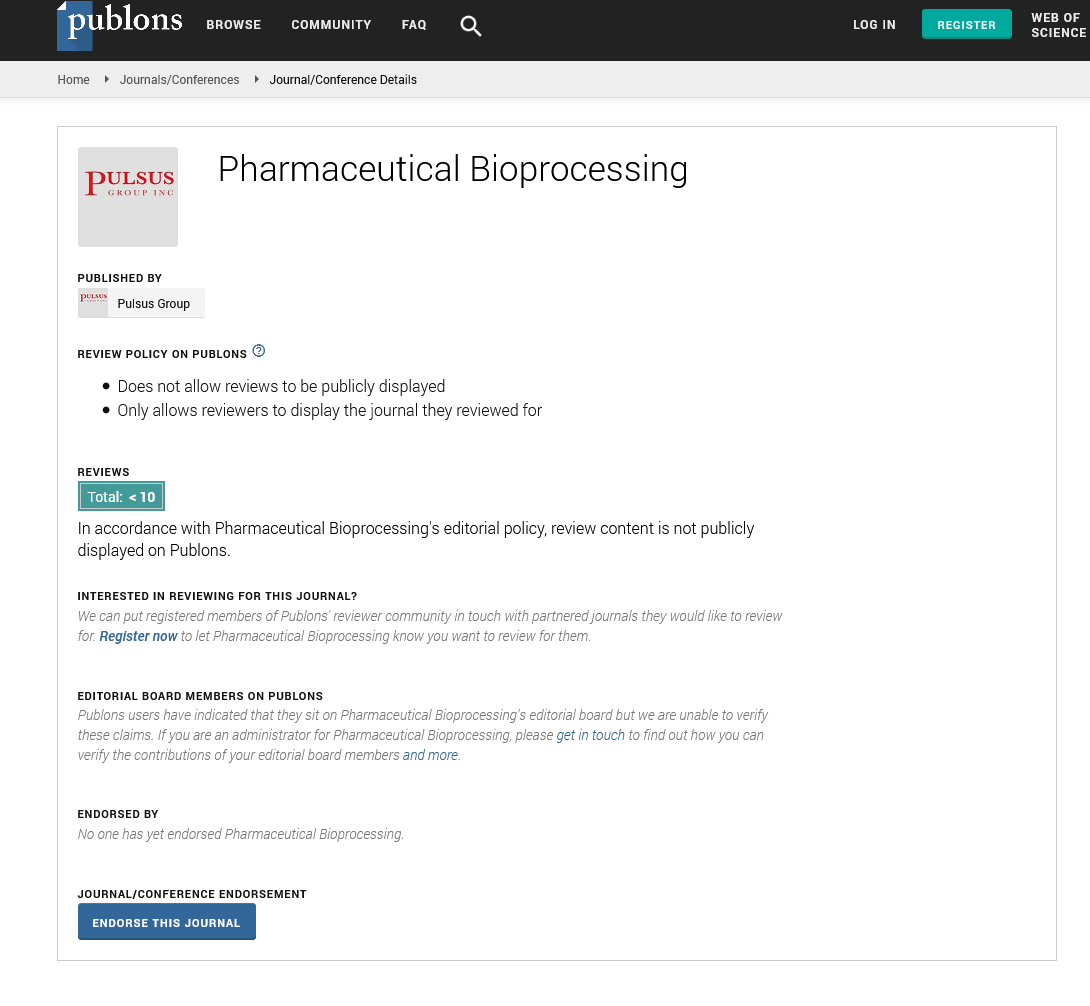Perspective - Pharmaceutical Bioprocessing (2024) Volume 12, Issue 2
Exploring the Boundless Potential of Biological Approaches
- Corresponding Author:
- Zhun Zhao
Department of Biological Science,
Sudip University,
Eger,
Hungary
E-mail: zhunzj@sari.ac.cn
Received: 06-Mar-2024, Manuscript No. FMPB-24-128994; Editor assigned: 11-Mar-2024, PreQC No. FMPB-24-128994 (PQ); Reviewed: 25-Mar-2024, QC No. FMPB-24-128994; Revised: 10-Apr-2024, Manuscript No. FMPB-24-128994 (R); Published: 17-Apr-2024, DOI: 10.37532/2048-9145.2024.12(2).162-163
Introduction
In an age marked by unprecedented technological advancements, the allure of innovation often leads us to the realm of complexity and sophistication. Yet, amidst the whirlwind of cutting-edge technologies, there exists a profound beauty in simplicity the elegance of biological approaches. From ancient practices rooted in traditional medicine to modern techniques harnessed in biotechnology, the utilization of living organisms and their processes offers a treasure trove of solutions to some of the most pressing challenges facing humanity. In this article, we embark on a journey to unravel the myriad facets of biological approaches, exploring their diverse applications, inherent advantages, and the transformative impact they hold across various domains.
Description
Embracing nature’s wisdom: Traditional practices and indigenous knowledge
Long before the advent of modern science, our ancestors looked to nature for remedies and solutions to ailments and adversities. Traditional healing systems, steeped in centuries of wisdom and observation, offer a rich tapestry of biological approaches rooted in indigenous knowledge. Herbal medicine, acupuncture, and Ayurveda are just a few examples of ancient practices that continue to endure, providing holistic and culturally resonant approaches to healthcare.
Long before the advent of modern science, our ancestors looked to nature for remedies and solutions to ailments and adversities. Traditional healing systems, steeped in centuries of wisdom and observation, offer a rich tapestry of biological approaches rooted in indigenous knowledge. Herbal medicine, acupuncture, and Ayurveda are just a few examples of ancient practices that continue to endure, providing holistic and culturally resonant approaches to healthcare.
Unleashing nature’s potential: Biotechnology and genetic engineering
In the modern era, the advent of biotechnology has propelled biological approaches to new heights, unlocking the full potential of living organisms for myriad applications. At the heart of this revolution lies genetic engineering, a powerful tool that enables scientists to manipulate the genetic makeup of organisms with precision and sophistication.
From the production of life-saving pharmaceuticals to the development of environmentally sustainable solutions, the applications of biotechnology are as diverse as they are transformative. Genetically modified crops engineered for enhanced yield, pest resistance, and nutritional fortification are revolutionizing agriculture, offering hope for food security in a rapidly changing world. Similarly, biopharmaceuticals derived from genetically engineered microbes are transforming the landscape of medicine, providing targeted therapies for a wide range of diseases.
Moreover, the field of synthetic biology is pushing the boundaries of biological engineering, offering the ability to design and construct novel biological systems with unprecedented precision and complexity. By harnessing the principles of genetic circuits and metabolic pathways, synthetic biologists are creating synthetic organisms capable of performing tasks ranging from environmental remediation to industrial production, ushering in a new era of bio-based innovation.
Harnessing nature’s harmony: Ecological restoration and conservation
Beyond the realms of medicine and industry, biological approaches play a crucial role in the conservation and restoration of ecosystems worldwide. As humanity grapples with the consequences of environmental degradation and biodiversity loss, the need for sustainable solutions has never been more pressing. Ecological restoration, guided by principles of biodiversity conservation and ecosystem resilience, seeks to rebuild and rehabilitate degraded landscapes through the strategic deployment of biological interventions. From reforestation efforts to the reintroduction of keystone species, biological approaches offer hope for the regeneration of ecosystems and the preservation of critical habitats.
Moreover, the emerging field of ecological engineering harnesses the power of natural processes to address complex environmental challenges, such as water pollution, soil erosion, and climate change. By integrating biological systems with engineering principles, ecological engineers design innovative solutions that mimic the resilience and efficiency of natural ecosystems, promoting harmony between human development and ecological sustainability.
Navigating ethical considerations and societal implications
While the potential of biological approaches is vast, their deployment is not without ethical considerations and societal implications. The use of Genetically Modified Organisms (GMOs) raises concerns regarding biosafety, biodiversity, and the long-term impact on ecosystems. Furthermore, questions surrounding ownership of genetic resources, equitable access to biotechnological innovations, and socio-economic disparities necessitate careful consideration and ethical deliberation.
Moreover, the convergence of biology with emerging technologies such as artificial intelligence and nanotechnology raises new ethical dilemmas and regulatory challenges. As we venture into uncharted territories, it is imperative that we approach the development and deployment of biological approaches with humility, foresight, and a commitment to ethical stewardship.
Conclusion
In conclusion, biological approaches offer a pathway to innovation that is deeply rooted in the wisdom of nature. From ancient healing practices to cutting-edge biotechnology, the utilization of living organisms and their processes holds immense promise for addressing some of the most pressing challenges facing humanity. As we navigate the complexities of the modern world, let us embrace the elegance of biological approaches, harnessing nature’s wisdom to forge a more sustainable, equitable, and resilient future for generations to come.


